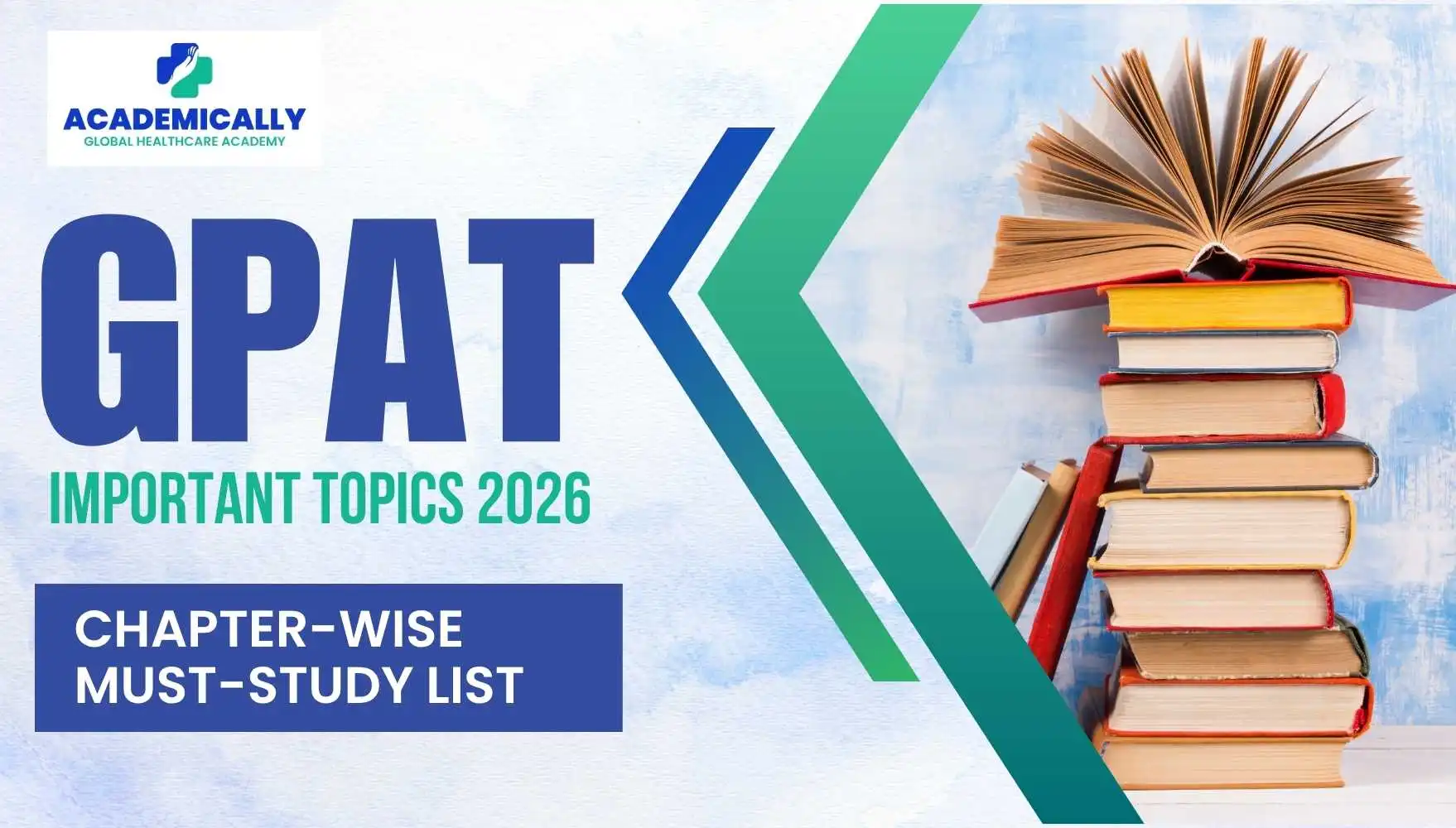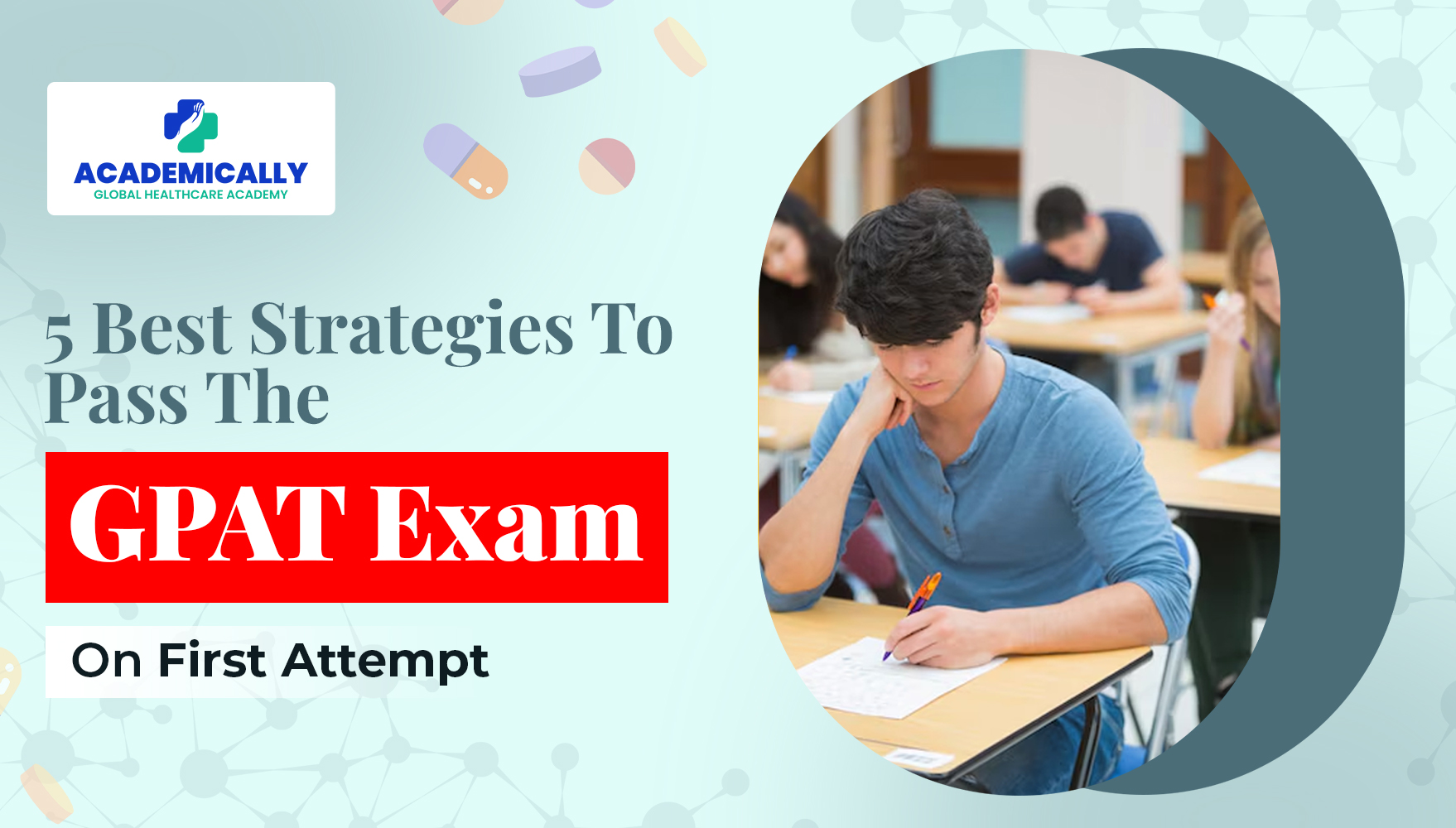The GPAT syllabus can feel like an endless ocean of topics. But what if you had a map to the hidden treasures? It might still be 8 months till the GPAT 2026 exam, but when it comes to preparation, it does not seem enough. Unless, you have strategised your preparation plan.
GPAT, the exam a pharmacy graduate waits for with both fear and anticipation. It is an annual calling for all aspirants who want to pursue M.Pharm in India. And with the syllabus covering the entirety of the B.Pharm, you can imagine how vast it is.
But worry not, for we have outlined the most important topics for you. After all, the fundamentals of a strategic preparation plan is understanding what to study and what to give a miss.
This blog will take you along for an exploration of some of the must-study subjects for the 2026 GPAT.
Let’s start.
The GPAT Exam Pattern
The Graduate Pharmacy Aptitude Test is an annual entry and eligibility exam for pharmacy graduates. The main aim of this exam is to analyse if the candidate has a thorough knowledge of pharmacy basics. Based on this, they are declared eligible for admission to some of the best pharmacy institutes in the country.
Here is a quick overview of the exam.
| Exam Particulars | Details |
| Name | Graduate Pharmacy Aptitude Test |
| Conducting Body | National Board of Examinations in Medical Sciences (NBEMS) |
| Duration | 3 Hrs |
| Mode | Computer-Based Test (Online) |
| No. of Questions | 125 Multiple-Choice Questions (MCQs) |
| Maximum Marks | 500 |
| Marking Scheme | Correct answer- +4 Incorrect response- -1 No attempt- 0 |
| Pass Marks | Varies each year |
| Eligibility: | B.Pharm Graduate B.Pharm final year student |
GPAT Exam Syllabus
The GPAT syllabus can seem overwhelming. However, it becomes easier if you break things down. Let’s start with the subject weightage
| Subject Area | Number of Questions | Total Marks | Weightage (%) |
| Pharmaceutical Chemistry | 38 | 152 | 30.5 |
| Pharmaceutics | 38 | 152 | 30.5 |
| Pharmacology | 28 | 112 | 22 |
| Pharmacognosy | 10 | 40 | 8 |
| Miscellaneous | 11 | 44 | 9 |
The table makes it clear that not all subjects can be taken equally. Pharmaceutics and pharmaceutical chemistry have the lion’s share of the questions. So, the intelligent thing would be to prioritize these two.
Let’s dive into these subjects in a little more detail.
GPAT Important Topics for 2026
1. Pharmaceutical Chemistry
This section covers the chemical aspects of drugs. Here, you will learn their basic structure and their therapeutic action. A strong foundation in organic chemistry is essential.
Organic Chemistry
- Stereochemistry
- Classes of aromatic compounds
- Amino acids and proteins
- Structure activity relation studies
Medicinal Chemistry
- Nomenclature and chemical moiety of medicinal drugs
- Therapeutic classes of drug
- Antimicrobial and antibacterial Drugs
- Neurological agents
- Cardiovascular drugs
Biochemistry
- Carbohydrates, proteins, and lipids
- Enzymes and their kinetics
- Vitamins and their role
- Biological oxidations and reductions
Inorganic Chemistry
- Pharmaceutical Impurities
- Monographs of important inorganic substances
- Isotopes and their pharmaceutical applications
- Dentifrices and Anticaries Agent
One of the most effective ways to tackle medchem is by flowcharts and tables. Colour code your classes for easy memorization.
SAR is another high scoring topic. Learn a few key points and you can answer multiple questions.
2. Pharmaceutics
Pharmaceutics is a core subject focusing on the formulation, development, and manufacturing of various drug dosage forms.
Dosage Forms
- Solid dosage forms
- Liquid dosage forms
- Semisolid dosage forms
- Additives such as
- Antioxidants
- Preservatives
- Coloring agents
- Flavors
Novel Drug Delivery Systems
- Sustained release and controlled release systems
- Transdermal drug delivery systems
- Targeted drug delivery
Bipharmaceutics and Pharmacokinetics
- Drug ADME profile
- Factors affecting bioavailability
- Methods to assess bioavailability and bioequivalence
Physical Pharmacy
- Diffusion
- Solubility
- Particle size
- Stability
If you want to score well in a short time, go for the calculation-based topics. And, don't just read. Practice numerical problems from Biopharmaceutics and Physical Pharmacy. They are frequent and high-scoring.
3. Pharmacology
This subject deals with the study of drugs and their effects on the body's systems.
Autacoids
- Histamine and Antihistamines
- Prostaglandins, leukotrienes, and thromboxanes
- Peptides and proteins
CNS, CVS, Endocrine Pharmacology
- CNS drugs: sedatives and antidepressants
- CVS drugs: anti-hypertensives and anti-arrhythmics
- Endocrine system drugs: antidiabetic drugs
Chemotherapy
- Principles of cancer chemotherapy
- Antimicrobial agents
- Chemotherapy of malignant diseases
Toxicology
- Principles of toxicology and treatment of poisoning
- Drug toxicity and side effects
Use flowcharts and classification tables to learn drug classes. Mnemonics are your best friend for remembering side effects and mechanisms.
These three are the subjects that carry the most weight. Nearly 80% of the total questions are from these three subjects. The next two subjects have relatively less weightage. If you don’t have much time, it is wiser to focus on pharmaceutics and pharmaceutical chemistry.
Although the next two subjects have fewer questions, they are often the deciding factor for a top rank.
4. Pharmacognosy
- Glycosides, alkaloids, tannins, and volatile oils
- Plant constituents
- Crude drug classification
5. Miscellaneous Subjects
- Microbiology
- Jurisprudence
- Pharmaceutical Management
- Pharmaceutical Analysis
Your Strategy for Success
The journey to cracking GPAT 2026 can seem long, but not impossible. Success isn't just about studying harder; it's about studying smarter.
Remember the core of our strategy:
- Prioritize the Giants: Dedicate the bulk of your energy to Pharmaceutics and Pharmaceutical Chemistry. These two subjects are the bedrock of a high score.
- Master the Game-Changers: Don't underestimate Pharmacology. Its 28 questions can make or break your rank.
- Secure Easy Wins: Pharmacognosy and other subjects like Pharmaceutical Analysis and Microbiology are your rank-boosters. While they carry less weight, the questions are often direct and can be easy marks if you've prepared well.
Food For Thought
Now that you have a list of topics, you can prepare a focused plan. Use this guide to structure your study schedule. Practice consistently with previous year questions. Take mock tests to simulate exam conditions. Enrol in GPAT Exam Preparation Course for a guided approach.
You have the topics and the strategy. It is time to execute with confidence and discipline. Securing a seat in a premier M.Pharm institute is well within your grasp.
Best of luck for GPAT 2026






